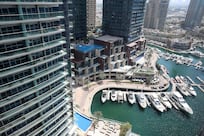ABU DHABI // The UAE is making a military intervention in Yemen to safeguard the Arabian Gulf’s security and stability, which the Shiite Houthi uprising is threatening, said Dr Anwar Gargash, the Minister of State for Foreign Affairs.
“The difficult decision has now become necessary in confronting the Houthi violence and rebellion and strategic threat to the Gulf through missiles, which pose an unacceptable growing threat,” he said on Twitter yesterday in explaining the UAE’s response to an urgent plea for help from Yemen’s president, Abdrabu Mansur Hadi.
On Wednesday, Saudi Arabia announced a regional coalition to launch airstrikes against the Houthi rebels.
The UAE, Qatar, Kuwait, Bahrain and Saudi Arabia are part of a wider 10-country coalition taking part in the operation.
Unconfirmed reports suggest that the UAE deployed 30 warplanes. Ahead of the Arab Summit to discuss the crisis in Yemen, Sheikh Abdullah bin Zayed, the Foreign Minister, took part in meetings with his regional counterparts about the issue in Sharm Al Sheikh, Egypt.
Dr Gargash said the developments in the region were in the favour of Iran, which “carried the banner” of the Houthis.
He said that could not be tolerated, adding that the Houthis’ militant nature meant that a political solution was not possible.
“The UAE leadership followed in detail developments in Yemen, aware of its strategic magnitude,” Dr Gargash said. “The security of the Gulf cannot be broken, and the security of Yemen is part of this security.”
The crisis in Yemen was an attempt to disrupt order in the region, and cooperation among Arab countries was necessary to secure regional stability, Dr Gargash said.
“The Emirati political and military stand in supporting Saudi and Gulf security is progressive,” he said.
“Our goal is to succeed in returning security to Yemen and to protect the security of the Gulf through Yemen.”
Dr Gargash stressed that the GCC countries decided to form the military coalition after exhausting all possible political solutions, which were met with aggression from the Houthis.
The GCC said the Houthis also posed a threat to the wider international community.
The GCC’s military intervention came less than three weeks after Mr Hadi called for a conference in Riyadh to tackle the rebellion.
In a letter on Tuesday, Mr Hadi sought urgent support from the rulers of Saudi Arabia, the UAE, Bahrain, Oman, Kuwait and Qatar.
He wrote that Yemenis had “sought with all our power to reach a peaceful solution to get Yemen out from a dark tunnel that the … Houthi orchestrators put the country in”, but to no avail.
“I appeal to you, my brothers, for the protection of Yemen, and I ask you … to provide instant support by all necessary means, including military intervention, to protect Yemen and its people from continuous Houthi aggression, and deter the expected attack to occur at any hour on the city of Aden and the rest of the southern regions, and to help Yemen in the face of Al Qaeda and ISIS.”
osalem@thenational.ae






